21 aug 2017
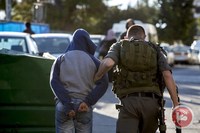
Israeli forces detained at least 25 Palestinians on Monday during predawn raids across the occupied West Bank, according to Palestinian and Israeli sources.
Israeli raids in Palestinian towns, villages, and refugee camps are a daily occurrence in the West Bank and East Jerusalem, with a biweekly average of 85 search and detention raids carried thus far in 2017, according to UN documentation.
According to Palestinian prisoner’s rights group Addameer, there are some 6,128 Palestinians being held in Israeli prisons, including at least 320 minors and 62 women and girls.
Northern West Bank
In the Nablus district, locals told Ma’an that Israeli forces detained four Palestinians from the village of Madama, and identified them as former prisoner Fadil Hamid al-Bitawi, Zeid al-Kharaz, Muhammad Salah Qit, 23, and Abada Fathi Qit, 23.
An Israeli army spokesperson told Ma’an that two Palestinians were detained in Madama, adding that three Palestinians were detained from Nablus city.
Central West Bank
The Palestinian Prisoner’s Society (PPS) reported that Israeli forces detained eight Palestinians from the Jerusalem district, citing five from Hizma, two from Biddu, and one from al-Eizariya.
PPS identified the five Palestinians detained from Hizma as Muhammad Fawzi al-Khatib, Abdullah al-Khatib, Ahed Salem Askar, Ahmad Waheed al-Khatib, and Abdullah Ahmad al-Khatib.
Adham Muhammad Saleh Bidwan and Saleh Kassab Ayyash were detained from Biddu, while 17-year-old Hasan Sharaf Abu al-Reish was detained from al-Eizariya, according to PPS.
The Israeli army confirmed one detention from al-Eizariya and one from Biddu.
In the Ramallah district, PPS reported that Israeli forces detained Muhammad Arqoub, 21, from Kafr Ein and Ibrahim Kheir Suliman, 29, from Deir Abu Mashaal.
The Israeli army spokesperson mentioned no detentions in the Ramallah district, but told Ma’an that one Palestinian was detained from the Salfit-area village of Kifl Haris.
Locals in Kifl Haris told Ma'an that a 20-year-old Palestinian was detained during a six-hour-raid in which Israeli forces escorted 1,000 settlers into the village to perform religious rituals.
Southern West Bank
PPS reported that one Palestinian, identified as Jafar Awida Ebiat, was detained from the al-Duheisha refugee camp in the Bethlehem district.
Locals in Hindaza south of Bethlehem said that Israeli forces raided the village, causing clashes to erupt with local Palestinian youth, with Israeli forces firing tear gas and live ammunition at the youth. No injuries were reported.
Israeli forces delivered an interrogation summons to 31-year-old Haroun Issa Qassim after raiding and searching his home.
In the Hebron district, PPS reported that eight Palestinians were detained, and identified them as Waleed Muhammad al-Titi, 54, his son Abd al-Rahman al-Titi, Muhammad Raed Aasafra, Mukhtar Saed Awad, 18, Thaer Ahmad Salibi, 18, Jaber Youssef Shalalda, Islam Waleed al-Shahatit and Tariq Nayif Masalma.
PPS did not specify the locations in which the eight were detained.
Meanwhile, the Israeli army spokesperson told Ma’an that nine Palestinians were detained from the Hebron district, and cited one detention from Sair, one from Kharsa, two from Beit Ummar, one from Dura, two from al-Fawwar refugee camp, one from Beit Awa, and one from Deir Samit.
IOF raids homes, kidnaps Palestinians in dawn W. Bank campaigns
The Israeli occupation forces (IOF) at dawn Monday raided several homes and kidnapped Palestinian citizens in different West Bank areas.
The Israeli army claimed in a report that its forces arrested overnight 17 wanted Palestinians, seven of them accused of carrying out attacks against Israelis.
Nine of those citizens were kidnapped from their homes from different areas of al-Khalil, including Fawwar refugee camp and the towns of Beit Ummar, Kharsa, Dura, and Beit Awwa.
Five others were also kidnapped in IOF campaigns in Nablus and nearby areas.
Journalist Ahmed al-Bitawi said that Israeli soldiers aboard patrol vehicles entered al-Dahiya neighborhood east of Nablus city and kidnapped his brother Fadel from his home, adding that they ransacked his brother’s house and car.
The IOF also stormed Khilat al-Amud area in the city and kidnapped a university student identified as Zaid al-Kharraz.
They also broke into and ransacked the house of Muhand Jawabreh in Asira ash-Shamaliya town, north of Nablus, and fired tear gas grenades at homes upon their withdrawal from the area. No arrest was made during the raid.
Two more young men were taken prisoners in IOF raids on homes in Madama town, south of Nablus. Another one from the same town was detained during his presence along with his family outside the Ibrahimi Mosque in al-Khalil city, according to local sources.
Soldiers also raided the Nablus house of Abdullah Hajj, the brother of a detained young man who is accused of being involved in a 2015 deadly attack near the West Bank settlement of Itamar, and confiscated his car.
In Jenin, the IOF reportedly stormed towns, and searched some homes and citizens at dawn.
Local sources told the Palestinian Information Center (PIC) that soldiers raided homes in Silat ad-Dhahr town, without making arrests, and set up a makeshift checkpoint at the main entrance to Fandaqumiya town where they embarked on searching passing vehicles and checking the IDs of passengers.
Soldiers also patrolled the streets of Sanur town, south of Jenin, and stayed at its main entrance for a while before withdrawing.
In Bethlehem, two young men identified as Ja’far Khalil and Tha’er Ahmed were kidnapped by the IOF from their homes in al-Qarna area.
Israeli raids in Palestinian towns, villages, and refugee camps are a daily occurrence in the West Bank and East Jerusalem, with a biweekly average of 85 search and detention raids carried thus far in 2017, according to UN documentation.
According to Palestinian prisoner’s rights group Addameer, there are some 6,128 Palestinians being held in Israeli prisons, including at least 320 minors and 62 women and girls.
Northern West Bank
In the Nablus district, locals told Ma’an that Israeli forces detained four Palestinians from the village of Madama, and identified them as former prisoner Fadil Hamid al-Bitawi, Zeid al-Kharaz, Muhammad Salah Qit, 23, and Abada Fathi Qit, 23.
An Israeli army spokesperson told Ma’an that two Palestinians were detained in Madama, adding that three Palestinians were detained from Nablus city.
Central West Bank
The Palestinian Prisoner’s Society (PPS) reported that Israeli forces detained eight Palestinians from the Jerusalem district, citing five from Hizma, two from Biddu, and one from al-Eizariya.
PPS identified the five Palestinians detained from Hizma as Muhammad Fawzi al-Khatib, Abdullah al-Khatib, Ahed Salem Askar, Ahmad Waheed al-Khatib, and Abdullah Ahmad al-Khatib.
Adham Muhammad Saleh Bidwan and Saleh Kassab Ayyash were detained from Biddu, while 17-year-old Hasan Sharaf Abu al-Reish was detained from al-Eizariya, according to PPS.
The Israeli army confirmed one detention from al-Eizariya and one from Biddu.
In the Ramallah district, PPS reported that Israeli forces detained Muhammad Arqoub, 21, from Kafr Ein and Ibrahim Kheir Suliman, 29, from Deir Abu Mashaal.
The Israeli army spokesperson mentioned no detentions in the Ramallah district, but told Ma’an that one Palestinian was detained from the Salfit-area village of Kifl Haris.
Locals in Kifl Haris told Ma'an that a 20-year-old Palestinian was detained during a six-hour-raid in which Israeli forces escorted 1,000 settlers into the village to perform religious rituals.
Southern West Bank
PPS reported that one Palestinian, identified as Jafar Awida Ebiat, was detained from the al-Duheisha refugee camp in the Bethlehem district.
Locals in Hindaza south of Bethlehem said that Israeli forces raided the village, causing clashes to erupt with local Palestinian youth, with Israeli forces firing tear gas and live ammunition at the youth. No injuries were reported.
Israeli forces delivered an interrogation summons to 31-year-old Haroun Issa Qassim after raiding and searching his home.
In the Hebron district, PPS reported that eight Palestinians were detained, and identified them as Waleed Muhammad al-Titi, 54, his son Abd al-Rahman al-Titi, Muhammad Raed Aasafra, Mukhtar Saed Awad, 18, Thaer Ahmad Salibi, 18, Jaber Youssef Shalalda, Islam Waleed al-Shahatit and Tariq Nayif Masalma.
PPS did not specify the locations in which the eight were detained.
Meanwhile, the Israeli army spokesperson told Ma’an that nine Palestinians were detained from the Hebron district, and cited one detention from Sair, one from Kharsa, two from Beit Ummar, one from Dura, two from al-Fawwar refugee camp, one from Beit Awa, and one from Deir Samit.
IOF raids homes, kidnaps Palestinians in dawn W. Bank campaigns
The Israeli occupation forces (IOF) at dawn Monday raided several homes and kidnapped Palestinian citizens in different West Bank areas.
The Israeli army claimed in a report that its forces arrested overnight 17 wanted Palestinians, seven of them accused of carrying out attacks against Israelis.
Nine of those citizens were kidnapped from their homes from different areas of al-Khalil, including Fawwar refugee camp and the towns of Beit Ummar, Kharsa, Dura, and Beit Awwa.
Five others were also kidnapped in IOF campaigns in Nablus and nearby areas.
Journalist Ahmed al-Bitawi said that Israeli soldiers aboard patrol vehicles entered al-Dahiya neighborhood east of Nablus city and kidnapped his brother Fadel from his home, adding that they ransacked his brother’s house and car.
The IOF also stormed Khilat al-Amud area in the city and kidnapped a university student identified as Zaid al-Kharraz.
They also broke into and ransacked the house of Muhand Jawabreh in Asira ash-Shamaliya town, north of Nablus, and fired tear gas grenades at homes upon their withdrawal from the area. No arrest was made during the raid.
Two more young men were taken prisoners in IOF raids on homes in Madama town, south of Nablus. Another one from the same town was detained during his presence along with his family outside the Ibrahimi Mosque in al-Khalil city, according to local sources.
Soldiers also raided the Nablus house of Abdullah Hajj, the brother of a detained young man who is accused of being involved in a 2015 deadly attack near the West Bank settlement of Itamar, and confiscated his car.
In Jenin, the IOF reportedly stormed towns, and searched some homes and citizens at dawn.
Local sources told the Palestinian Information Center (PIC) that soldiers raided homes in Silat ad-Dhahr town, without making arrests, and set up a makeshift checkpoint at the main entrance to Fandaqumiya town where they embarked on searching passing vehicles and checking the IDs of passengers.
Soldiers also patrolled the streets of Sanur town, south of Jenin, and stayed at its main entrance for a while before withdrawing.
In Bethlehem, two young men identified as Ja’far Khalil and Tha’er Ahmed were kidnapped by the IOF from their homes in al-Qarna area.
20 aug 2017
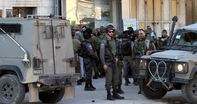
The Israeli occupation forces at daybreak Sunday stormed Eastern Bartaa town, in the northern West Bank province of Jenin, and subjected Palestinians to exhaustive questioning.
According to local sources, a flock of Israeli military jeeps rolled into Eastern Bartaa on account of anti-occupation stone-throwing.
Palestinian youth and civilians in the town have been made to endure intensive interrogation by the Israeli army in the hunt for the alleged stone-hurlers.
According to local sources, a flock of Israeli military jeeps rolled into Eastern Bartaa on account of anti-occupation stone-throwing.
Palestinian youth and civilians in the town have been made to endure intensive interrogation by the Israeli army in the hunt for the alleged stone-hurlers.
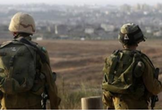
Israeli soldiers abducted, on Sunday at dawn, two young Palestinian men, near the border fence, east of Rafah, in the southern part of the Gaza Strip, and fired many live rounds into Palestinian lands close to the fence.
The Palestinian News & Info Agency (WAFA) said the soldiers, stationed in military towers and tanks across the border fence, abducted the two young man, and took them to an unknown destination.
It added that the soldiers also fired many live rounds into the area, mainly targeting farmlands close to the fence.
It is worth mentioning that the army prevents the Palestinians, including the farmers and workers, from approaching the fence, an issue that prevents them from working on various sections of their own lands.
The Palestinian News & Info Agency (WAFA) said the soldiers, stationed in military towers and tanks across the border fence, abducted the two young man, and took them to an unknown destination.
It added that the soldiers also fired many live rounds into the area, mainly targeting farmlands close to the fence.
It is worth mentioning that the army prevents the Palestinians, including the farmers and workers, from approaching the fence, an issue that prevents them from working on various sections of their own lands.
19 aug 2017
Abu Ghanam was one of the six Palestinians killed by Israeli forces during protests related to al-Aqsa.
Maternity ward raided
“Words fail to convey the gravity of the police’s conduct inside the hospital,” B’Tselem said, according to Days of Palestine.
“The fright engendered by scores of armed police raiding a hospital cannot be downplayed. When these feelings of terror are accompanied by an assault on medical staff and interference with medical care, the situation escalates to one of a real risk to the lives of the many patients in the hospital.”
B’Tselem’s report includes testimonies from medical staff describing dozens of heavily armed Israeli personnel raiding the hospital. They forced their way in, attacking security guards and civilians, who tried to defend the facility, with stun grenades and sponge-tipped bullets.
The Israelis kicked people out of the blood bank, where dozens of volunteers were trying to donate desperately needed blood. They raided the maternity ward, including a room where a mother was present, and sprayed pepper spray into another that was empty. Staff gathered most of the mothers in one room and took their babies to the nursery to protect them.
Israeli forces blocked ambulance
Abu Ghanam had been involved in confrontations between Jerusalem youths and occupation forces in the al-Tur neighborhood when he was shot in the chest.
Israeli forces stood around him for five to 10 minutes without providing any medical assistance, according to B’Tselem. Then, when a Red Crescent ambulance arrived, Israeli forces tried to obstruct it. But, the paramedics were able to reach Abu Ghanam and get him into the ambulance – which one of the Israeli soldiers tried to get into as well.
“There was some mutual shoving between one of my colleagues and the two officers for about a minute, and then we got into the ambulance,” one of the medics told B’Tselem. “I locked the ambulance with the central locking system.”
The medics then managed to drive to the hospital, despite Israeli forces trying to block their way.
But, for all the efforts of the medical staff, they could not save Abu Ghanam’s life. After he died, Palestinians managed to smuggle him out of the hospitall and take him for immediate burial, to avoid Israeli forces confiscating his body – a frequent form of collective punishment.
‘Cheap’ lives
A report last month by Amnesty International called the Israeli assault on the hospital a “ruthless display of force.”
“The conduct of Israeli forces who carried out violent raids on Al-Makassed hospital harassing and intimidating staff and patients is utterly deplorable,” Amnesty’s deputy director for the Middle East and North Africa, said. “There can be no justification for preventing medical workers from caring for a critically wounded patient.”
Israeli forces habitually raid hospitals, even carrying out extrajudicial executions inside them.
The 21 July assault on Al-Makassed hospital, B’Tselem said, “is part of a much larger picture, one in which Israeli authorities repeatedly show the hundreds of thousands of Palestinian residents of Jerusalem just how unwanted they are in their own city and how cheap their lives are.”
Maternity ward raided
“Words fail to convey the gravity of the police’s conduct inside the hospital,” B’Tselem said, according to Days of Palestine.
“The fright engendered by scores of armed police raiding a hospital cannot be downplayed. When these feelings of terror are accompanied by an assault on medical staff and interference with medical care, the situation escalates to one of a real risk to the lives of the many patients in the hospital.”
B’Tselem’s report includes testimonies from medical staff describing dozens of heavily armed Israeli personnel raiding the hospital. They forced their way in, attacking security guards and civilians, who tried to defend the facility, with stun grenades and sponge-tipped bullets.
The Israelis kicked people out of the blood bank, where dozens of volunteers were trying to donate desperately needed blood. They raided the maternity ward, including a room where a mother was present, and sprayed pepper spray into another that was empty. Staff gathered most of the mothers in one room and took their babies to the nursery to protect them.
Israeli forces blocked ambulance
Abu Ghanam had been involved in confrontations between Jerusalem youths and occupation forces in the al-Tur neighborhood when he was shot in the chest.
Israeli forces stood around him for five to 10 minutes without providing any medical assistance, according to B’Tselem. Then, when a Red Crescent ambulance arrived, Israeli forces tried to obstruct it. But, the paramedics were able to reach Abu Ghanam and get him into the ambulance – which one of the Israeli soldiers tried to get into as well.
“There was some mutual shoving between one of my colleagues and the two officers for about a minute, and then we got into the ambulance,” one of the medics told B’Tselem. “I locked the ambulance with the central locking system.”
The medics then managed to drive to the hospital, despite Israeli forces trying to block their way.
But, for all the efforts of the medical staff, they could not save Abu Ghanam’s life. After he died, Palestinians managed to smuggle him out of the hospitall and take him for immediate burial, to avoid Israeli forces confiscating his body – a frequent form of collective punishment.
‘Cheap’ lives
A report last month by Amnesty International called the Israeli assault on the hospital a “ruthless display of force.”
“The conduct of Israeli forces who carried out violent raids on Al-Makassed hospital harassing and intimidating staff and patients is utterly deplorable,” Amnesty’s deputy director for the Middle East and North Africa, said. “There can be no justification for preventing medical workers from caring for a critically wounded patient.”
Israeli forces habitually raid hospitals, even carrying out extrajudicial executions inside them.
The 21 July assault on Al-Makassed hospital, B’Tselem said, “is part of a much larger picture, one in which Israeli authorities repeatedly show the hundreds of thousands of Palestinian residents of Jerusalem just how unwanted they are in their own city and how cheap their lives are.”
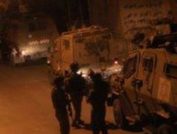
Israeli soldiers invaded, on Saturday at dawn, Jenin refugee camp, in the northern West Bank governorate of Jenin, injured three Palestinians with live fire, abducted three others and summoned two siblings for interrogation. The soldiers also summoned several Palestinians from Bethlehem for interrogation.
Media sources in Jenin said dozens of soldiers invaded Jenin refugee camp, and clashed with many youngsters, who hurled stones and empty bottles on the military jeeps.
The soldiers shot three young men, identified as Mustafa Akram Qombo’, Abu Ali al-Kastouni, and Wi’am Eyad Hannoun, with live fire, before local medics moved them to Khalil Suleiman governmental hospital in Jenin.
Furthermore, the soldiers abducted Mohammad Ahmad Abu al-Haija, Mohammad Ararawi, and Kamal Mohammad Awad.
The army also detonated doors of several homes, before invading and violently searching them.
Owners o two of the invaded homes have been identified as Akram Abu al-Haija and Mohammad Abu al-Haija, while the soldiers also summoned Amin and Baha’, the two sons of Akram, for interrogation in Salem base, west of Jenin.
In addition, the soldiers invaded Beit Fajjar town and Marah Rabah village, south of Bethlehem, and summoned several young men for interrogation in Etzion military base and security center, north of Bethlehem.
The Palestinian Prisoners’ Society (PPS) said the summoned Palestinians are former political prisoners, identified as Ibrahim Deeriyya, Ahmad Taqatqa and Ahmad Sa’ada, from Beit Fajjar.
It added that the soldiers also invaded and ransacked the home of Ahmad Ayed Deeriyya, who was forced out of the West Bank, and into the Gaza Strip, several years ago.
Furthermore, the soldiers invaded Marah Rabah village, and broke into the home of Mahmoud Mohammad Sheikh, before summoning him for interrogation in Etzion.
Media sources in Jenin said dozens of soldiers invaded Jenin refugee camp, and clashed with many youngsters, who hurled stones and empty bottles on the military jeeps.
The soldiers shot three young men, identified as Mustafa Akram Qombo’, Abu Ali al-Kastouni, and Wi’am Eyad Hannoun, with live fire, before local medics moved them to Khalil Suleiman governmental hospital in Jenin.
Furthermore, the soldiers abducted Mohammad Ahmad Abu al-Haija, Mohammad Ararawi, and Kamal Mohammad Awad.
The army also detonated doors of several homes, before invading and violently searching them.
Owners o two of the invaded homes have been identified as Akram Abu al-Haija and Mohammad Abu al-Haija, while the soldiers also summoned Amin and Baha’, the two sons of Akram, for interrogation in Salem base, west of Jenin.
In addition, the soldiers invaded Beit Fajjar town and Marah Rabah village, south of Bethlehem, and summoned several young men for interrogation in Etzion military base and security center, north of Bethlehem.
The Palestinian Prisoners’ Society (PPS) said the summoned Palestinians are former political prisoners, identified as Ibrahim Deeriyya, Ahmad Taqatqa and Ahmad Sa’ada, from Beit Fajjar.
It added that the soldiers also invaded and ransacked the home of Ahmad Ayed Deeriyya, who was forced out of the West Bank, and into the Gaza Strip, several years ago.
Furthermore, the soldiers invaded Marah Rabah village, and broke into the home of Mahmoud Mohammad Sheikh, before summoning him for interrogation in Etzion.
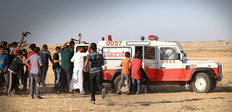
Local sources reported that an unidentified youth was shot in the chest and injured with live ammunition fired by Israeli forces at a protest march near the northern border wall.
According to the sources, the injured youth was taken to the Indonesian Hospital in Beit Lahia, where his condition was initially listed as critical, but was later changed to serious, after he was stabilized by medical personnel.
A number of other Palestinians participating in the protest suffered the effects of tear gas inhalation, and were treated on site.
The protest took place east of Jabalia near the Shuhada cemetery, in the northern part of the Gaza Strip. Protesters gathered and marched toward the fence, shouting slogans for Palestinian liberation.
A separate protest took place Friday afternoon in the eastern part of the Gaza Strip, with participants marching toward Nahal Oz military base. The soldiers fired tear gas and live ammunition toward the crowd, but no injuries were reported.
In addition, protests took place Friday near al-Boreij refugee camp in central Gaza, and east of Rafah and Khan Younis in the southern part of the Gaza Strip.
The Israeli military reported that during the Jabalia protest, Palestinian youths burned tires and threw stones at the soldiers, but there were no confirmations of those reports.
Local sources in Jabalia reported that the Israeli soldiers stationed in guard towers at the military base located at the border between Gaza and Israel fired from their towers down at the crowd of unarmed Palestinians, who they claimed were protesting too close to the Wall.
According to the sources, the injured youth was taken to the Indonesian Hospital in Beit Lahia, where his condition was initially listed as critical, but was later changed to serious, after he was stabilized by medical personnel.
A number of other Palestinians participating in the protest suffered the effects of tear gas inhalation, and were treated on site.
The protest took place east of Jabalia near the Shuhada cemetery, in the northern part of the Gaza Strip. Protesters gathered and marched toward the fence, shouting slogans for Palestinian liberation.
A separate protest took place Friday afternoon in the eastern part of the Gaza Strip, with participants marching toward Nahal Oz military base. The soldiers fired tear gas and live ammunition toward the crowd, but no injuries were reported.
In addition, protests took place Friday near al-Boreij refugee camp in central Gaza, and east of Rafah and Khan Younis in the southern part of the Gaza Strip.
The Israeli military reported that during the Jabalia protest, Palestinian youths burned tires and threw stones at the soldiers, but there were no confirmations of those reports.
Local sources in Jabalia reported that the Israeli soldiers stationed in guard towers at the military base located at the border between Gaza and Israel fired from their towers down at the crowd of unarmed Palestinians, who they claimed were protesting too close to the Wall.
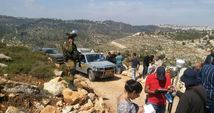
Israeli soldiers attacked, Friday, the weekly nonviolent protest against the Annexation Wall and colonies, in Bil’in village, west of the central West Bank city of Ramallah, causing some protesters to suffer the effects of teargas inhalation.
The protest was held approximately by ten Palestinians, ten Israelis and fifteen international peace activists.
Clashes took place between the soldiers and several Palestinian youngsters after the army attacked the weekly protest, causing many to suffer the effects of teargas inhalation.
The protest was held approximately by ten Palestinians, ten Israelis and fifteen international peace activists.
Clashes took place between the soldiers and several Palestinian youngsters after the army attacked the weekly protest, causing many to suffer the effects of teargas inhalation.
18 aug 2017
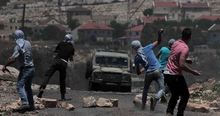
Israeli Occupation Forces (IOF) quelled on Friday the anti-settlement weekly march in Kafr Qaddum town in Qalqilya. The peaceful march also demands the opening of the street which has been closed by the IOF for over 14 years.
Coordinator of the popular resistance in the town, Murad Shteiwi, said that IOF soldiers showered the participants with rubber bullets and tear gas canisters. No injuries were reported.
Israeli soldiers stormed the homes of Palestinians and used rooftops as military watch points. IOF troops also set up several ambushes in some of abandoned houses in order to arrest protesters, he added.
Shteiwi pointed out that hundreds of Palestinians along with foreign solidarity activists participated in the march that kicked off after Friday prayer and chanted anti-occupation slogans.
Coordinator of the popular resistance in the town, Murad Shteiwi, said that IOF soldiers showered the participants with rubber bullets and tear gas canisters. No injuries were reported.
Israeli soldiers stormed the homes of Palestinians and used rooftops as military watch points. IOF troops also set up several ambushes in some of abandoned houses in order to arrest protesters, he added.
Shteiwi pointed out that hundreds of Palestinians along with foreign solidarity activists participated in the march that kicked off after Friday prayer and chanted anti-occupation slogans.

